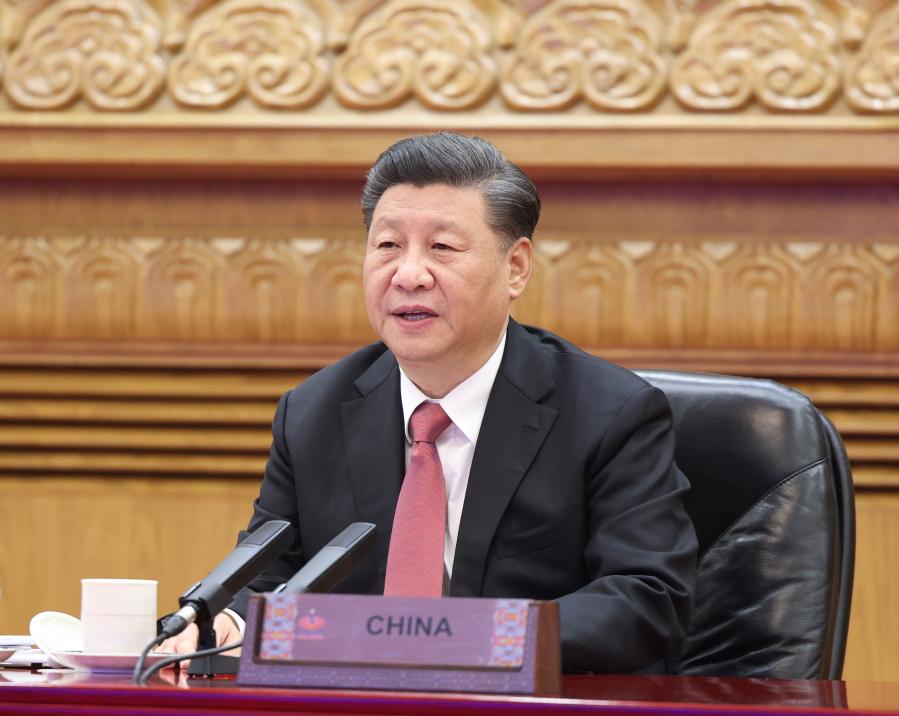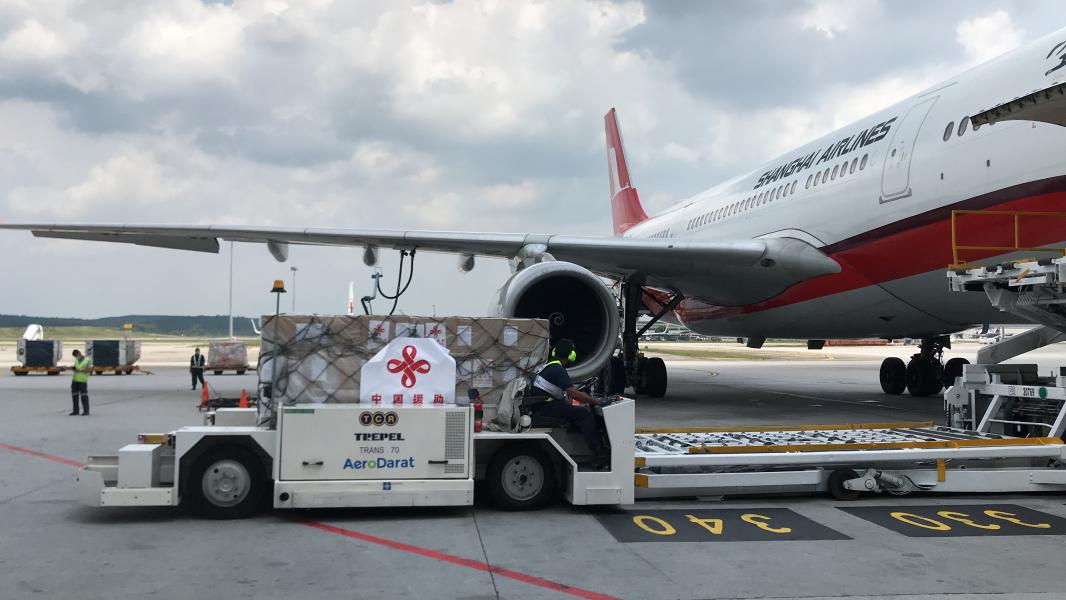Xi hails APEC 'family spirit,' calling for joint fight against COVID-19, economic slowdown
Chinese President Xi Jinping on Friday called for taking the Asia-Pacific cooperation to a new phase to advance the building of an Asia-Pacific community with a shared future amid the COVID-19 pandemic and economic slowdown.
Chinese President Xi Jinping on Friday called for taking the Asia-Pacific cooperation to a new phase to advance the building of an Asia-Pacific community with a shared future amid the COVID-19 pandemic and economic slowdown.

Chinese President Xi Jinping delivers a speech at the 27th Asia-Pacific Economic Cooperation (APEC) Economic Leaders' Meeting via video link, in Beijing, capital of China, Nov. 20, 2020. [Photo/Xinhua]
Citing a Malaysian saying "bukit sama didaki, lurah sama dituruni," which means to climb the hill together and go down the ravine together, Xi highlighted the essence of the Asia-Pacific family spirit at the 27th Asia-Pacific Economic Cooperation (APEC) Economic Leaders' Meeting in Beijing via video link.
The COVID-19 pandemic, mounting unilateralism, protectionism, as well as a backlash against economic globalization weighed on the region's economy, which has seen its first negative growth in decades. The prospects of Asia-Pacific cooperation is crucial to regional development, people's livelihoods, and the world's future.

Chinese President Xi Jinping and other leaders and representatives from member economies of the Asia-Pacific Economic Cooperation (APEC) pose for a group photo while launching the "APEC Putrajaya Vision 2040" via video link on Nov. 20, 2020. Xi delivered a speech at the 27th APEC Economic Leaders' Meeting on Friday in Beijing via video link. [Photo/Xinhua]
Spearheading economic globalization
In his speech, Xi highlighted promoting openness and inclusiveness, accelerating innovation-driven growth, enhancing regional connectivity, and pushing for mutually beneficial cooperation, as the region endeavors to dig its way out of the economic slowdown caused by the COVID-19 pandemic.
"The approach of pursuing cooperation as equals and resolving differences with mutual respect is what essentially makes economic development and prosperity in the Asia-Pacific possible," Xi said.
Economic cooperation in the region has never been a zero-sum political game in which one gains at the expense of the other, but a platform for mutually beneficial and win-win development, according to Xi.
He called for continued efforts to press ahead with regional economic integration for the early realization of a Free Trade Area of the Asia-Pacific, adding that China will favorably consider joining the Comprehensive and Progressive Agreement for Trans-Pacific Partnership.
His appeals followed Sunday's signing of the world's largest free trade agreement, the Regional Comprehensive Economic Partnership (RCEP), by 10 member countries of the Association of Southeast Asian Nations and China, Japan, the Republic of Korea, Australia and New Zealand.
Oh Ei Sun, principal advisor for Malaysia's Pacific Research Center, said that Asia-Pacific economies should promote free trade, especially piggybacking on the recently concluded RCEP, which he believes will give impetus to the building of the Free Trade Area of the Asia-Pacific.
The Asia-Pacific region should remain the bellwether and help make economic globalization more open, inclusive, balanced and beneficial to all, Xi said.
Xi underscored efforts to implement the APEC Internet and Digital Economy Roadmap in full to spur the dissemination and application of new technologies, strengthen digital infrastructure, and close the digital divide, while calling for building an open, fair, equitable, and non-discriminatory business environment.

A worker transports donated materials from the Chinese government to Malaysia at the Kuala Lumpur International Airport in Sepang, Selangor, Malaysia, on March 28, 2020. [Photo/Chinese Embassy in Malaysia/Handout via Xinhua]
Jointly fighting COVID-19
At a time when the COVID-19 pandemic accelerates changes unseen in a century and throws the world into a recession, promoting connectivity is especially important for the Asia-Pacific region to get through the tough times.
Xi called for efforts to continue the implementation of the APEC Connectivity Blueprint to facilitate the smooth, safe and orderly flow of people, goods, capital and data and achieve a seamlessly connected Asia-Pacific.
China has opened "fast tracks" to facilitate personnel mobility with APEC members including Indonesia, the Republic of Korea, and Singapore in the time of the pandemic, and will continue to improve such mobility.
The country stands ready to work with all parties to set up "green lanes," which will help make customs clearance more efficient, unclog bottlenecks, and reconnect disrupted links.
To facilitate a joint fight against COVID-19 and contribute to regional economic recovery, China supports APEC in strengthening policy exchanges and capacity building in the areas of public health and micro, small and medium-sized enterprises. It also proposes telemedicine for the timely and effective treatment of patients in poverty-stricken and remote regions.
Noting that fighting COVID-19 is the most pressing task, Xi urged efforts to promote mutual recognition of the COVID-19 related health information of international travelers, make COVID-19 vaccines a global public good, and improve the vaccines' accessibility and affordability in developing countries.
"COVID-19 serves as another reminder that only solidarity and cooperation can enable us to prevail over challenges," Xi said.
He stressed deepening the Asia-Pacific partnership featuring mutual trust, inclusiveness, cooperation, and mutual benefit, and "making the pie of cooperation even bigger" to achieve common prosperity.

